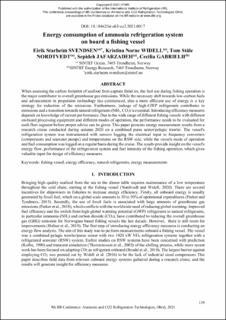| dc.contributor.author | Svendsen, Eirik Starheim | |
| dc.contributor.author | Widell, Kristina Norne | |
| dc.contributor.author | Nordtvedt, Tom Ståle | |
| dc.contributor.author | Jafarzadeh, Sepideh | |
| dc.contributor.author | Gabrielii, Cecilia H | |
| dc.date.accessioned | 2022-02-21T13:50:17Z | |
| dc.date.available | 2022-02-21T13:50:17Z | |
| dc.date.created | 2021-10-05T13:14:26Z | |
| dc.date.issued | 2021 | |
| dc.identifier.isbn | 978-2-36215-046-3 | |
| dc.identifier.issn | 0151-1637 | |
| dc.identifier.uri | https://hdl.handle.net/11250/2980566 | |
| dc.description.abstract | When assessing the carbon footprint of seafood from capture fisheries, the fuel use during fishing operation is the major contributor to overall greenhouse gas emissions. While the necessary shift towards low-carbon fuels and advancement in propulsion technology has commenced, also a more efficient use of energy is a key strategy for reduction of the emissions. Furthermore, leakage of high-GWP refrigerants contributes to emissions and a transition towards natural refrigerants (NH3, CO2) is essential. Introducing efficiency measures depends on knowledge of current performance. Due to the wide range of different fishing vessels with different on-board processing equipment and different modes of operation, the performance needs to be evaluated for each fleet segment before proper advise can be given. This paper presents energy measurement results from a research cruise conducted during autumn 2020 on a combined purse seiner/pelagic trawler. The vessel's refrigeration system was instrumented with sensors logging the electrical input to frequency converters (compressors and seawater pumps) and temperatures on the RSW side, while the vessels mode of operation and fuel consumption was logged on a regular basis during the cruise. The results provide insight on the vessel's energy flow, performance of the refrigeration system and fuel intensity of the fishing operation, which gives valuable input for design of efficiency measures. | en_US |
| dc.language.iso | eng | en_US |
| dc.publisher | IIR | en_US |
| dc.relation.ispartof | 9th Conference on Ammonia and CO2 Refrigeration Technologies Ohrid, R. Macedonia September 16-17, 2021 Proceedings | |
| dc.relation.ispartofseries | Sciences et technique du froid; | |
| dc.title | Energy consumption of ammonia refrigeration system on board a fishing vessel | en_US |
| dc.type | Chapter | en_US |
| dc.type | Peer reviewed | en_US |
| dc.description.version | acceptedVersion | en_US |
| dc.source.pagenumber | 129-138 | en_US |
| dc.identifier.cristin | 1943416 | |
| dc.relation.project | Norges forskningsråd: 294662 | en_US |
| cristin.ispublished | true | |
| cristin.fulltext | postprint | |
| cristin.qualitycode | 1 | |
